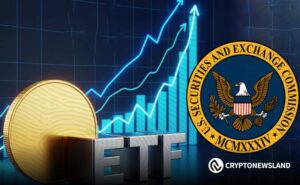News
Stay up to date on the latest crypto trends with our expert, in-depth coverage.

The financing news was retweeted by Solana's official Twitter account. Is Bulk stirring up the decentralized perpetual contract exchange sector?

Federal Reserve Chairman Powell delivered a dovish signal, raising market expectations for an October rate cut to 91.9%. However, the crypto market experienced significant liquidations, and traders expressed concerns about market weakness. Summary generated by Mars AI. The accuracy and completeness of this summary are still being iterated and updated by the Mars AI model.




In Brief Nine major European banks collaborate to issue Euro-indexed stablecoin. The stablecoin launch targets the second half of 2026 after regulatory approval. The initiative reinforces Europe against U.S.-based stablecoin market dominance.

In Brief ASTER captured market attention with a 2,587% surge since its launch. On-chain data indicates significant confidence and liquidity concentrations in ASTER. Investors should be wary of whale movements and potential long-term risks.



- 19:42Daly: Tariffs have little impact on inflation, labor market is more significantly affectedChainCatcher news, according to Golden Ten Data, Federal Reserve's Daly stated that the impact of tariffs on inflation has not been as significant as expected, but instead has had a greater effect on the labor market.
- 19:29Federal Reserve's Cook submits defense brief to the U.S. Supreme Court regarding Trump's intention to dismiss himJinse Finance reported that Federal Reserve Governor Lisa Cook has submitted a response brief to the U.S. Supreme Court regarding President Trump's attempt to remove her from office.
- 18:53Federal Reserve Governor Barr calls for decoupling bank capital requirements from stress tests and customizing them individuallyJinse Finance reported that Federal Reserve Governor Barr stated that setting bank capital levels should be separated from the results of stress tests and should be more closely tailored to the individual circumstances of each bank. He is seeking ways to maintain the rigor of the tests amid industry calls for relaxation. Barr opposes increasing the transparency of stress tests in advance and linking them to formulaic capital requirements. He stated that such an outcome could make capital levels "less targeted than they are now and unable to fully reflect the unique business models, risk exposures, and risk profiles of specific companies." Barr believes that regulators should not weaken this process but should maintain the rigor of the tests and, in special cases, use their authority to impose personalized capital requirements based on factors such as a bank's capital structure, risk level, complexity, and financial activities. Stress tests were introduced after the 2008 financial crisis to enhance banks' ability to withstand future economic shocks and to assess how banks would perform in hypothetical economic downturns. Barr has been one of the main supporters of these tests.